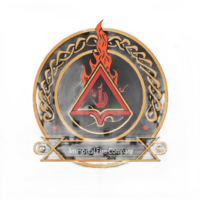Immortal Fire Company
 | |
| Type | Private Limited Company |
|---|---|
| Industry | Chemical |
| Founded | ~1598 AN |
| Headquarters | Surenshahr, Suren Confederacy |
| Products | Chemical precursors, fertiliser, gases, explosives, salt |
The Anosh Adur Sherkat (Babkhan: Immortal Fire Company) is a Surenid chemical company, that had established itself as one of the foremost Euran producers of ammonia, ammonium chloride, sodium chloride, sodium hydroxide and chlorine.
Formed by the survivors of the salt-mining guilds of the Durranian uplands during the years following the Babkhan Holocaust of 1598. The Brotherhood of the Immortal Flame offered sanctuary to Zurvanite priests as well as the survivors of an Emir of Sajin GmbH chemical research institute, all of whom were fleeing the atomic desolation of the coastal and lowland cities. By these means the salt-miners, sheltering the learned fugitives in their vast network of underground caverns, came to possess a repository of the alchemical lore in the Euran tradition, where the occult and the processes of industrial synthesisation, decidedly overlapped.
After a period of quasi-independence prior to the Second Euran War, where their main opponents and trading partners were the copper mining clans of the uplands, a number of whom had succumbed to Bassarid and Nazarene heresies and against whom holy war had to be waged, the Brotherhood of the Immortal Flame fell under the protection of the House of Suren and thus found itself brought into the wider Suren Confederacy. During this time the Brotherhood reorganised itself as the Immortal Fire Company and focused upon developing an industrial capacity in line with the direction and investment provided by the Suren. Initially concerned with the production of ever more inventive forms of explosive, incendiary materials, and poisonous gases, it was gradually realised that the accumulation of knowledge and precursor chemicals could be productively utilised in more lucrative commercial enterprises.
Construction of the first Immortal Fire nitrogen plant commenced in 1672, as the Kalirion Fracture had abruptly ended the export of Benacian bonemeal[1], a primary agricultural fertiliser throughout the economic sphere of the Raspur Pact and its adjacent periphery, and the opportunities for a new entrant into the manufacture of nitrate based fertiliser was now manifest.
During the 1680's two urea processing plants were constructed outside of Surenshahr, followed by the construction of an ammonia plant, air compressors, a second nitrogen plant, and the commencement of work on a thermal reaction exchanger dome in 1687. By the end of the decade the main focus of manufacturing will have shifted from the upland regions to Surenshahr, seeking to capitalise on opportunities offered by reduced transportation costs afforded by the Pan-Euran Highway.
The company, true to its roots, remains a collective and fraternal organisation, with "shares" in the company belonging to the workforce and to the heads of household who claim direct descent from the founding membership of the Brotherhood. Representation on the governing Board of Control reflects both this heritage and the present political realities of the company. Three directors are elected by the "shareholders" of the company, three are appointed by the Babkhan Orthodox Church (practitioners of Zurvanism, not to be confused with any similarly named Nazarene entity), and the final three appointed by the Surenshah whose confirmation is also required for the appointment of the company's chief executive officer, elected by the Board of Control.
In 1690 AN the construction of two thermal reaction chambers and and their associated feeder beds at the Surenshahr plant allowed for the initiation of production cycles for concentrated hydrochloric acid and concentrated nitric acid, nitrosyl chloride and chlorine gas in appreciable volumes.
- ^ harvested in industrial quantities from the crumbled remains of liches, deep-singers, and Froyalaners